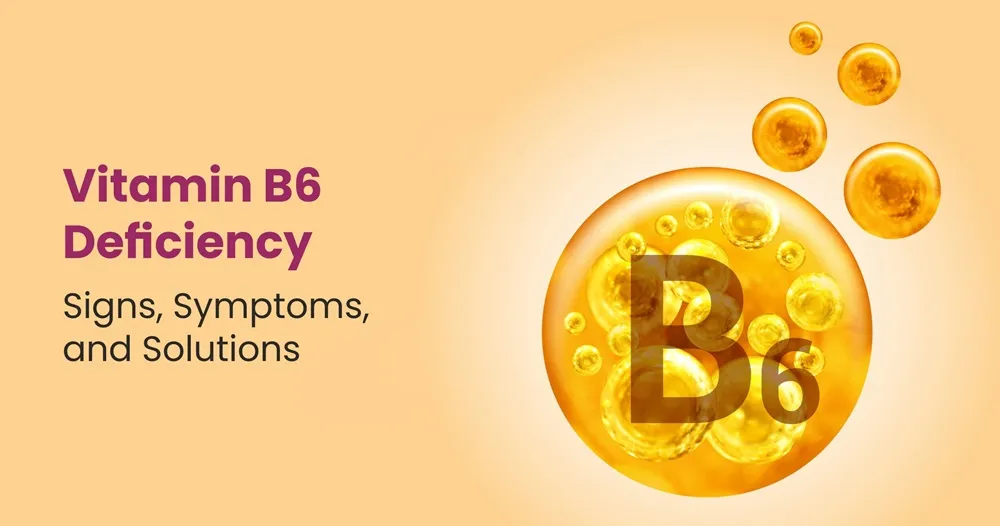Vitamin B6 Deficiency: Signs, Symptoms, and Solutions
Mar 28, 2024

Vitamin B6, also known as pyridoxine, is an essential nutrient that plays many important roles in the body. Recent research estimates that nearly 20% of the Indian population may have low levels of vitamin B6. This seemingly small deficiency can lead to some major health issues if left untreated. Read on to learn about the common signs and symptoms of Vitamin B6 deficiency, as well as potential solutions to increase your levels naturally or through supplementation.
What is Vitamin B6 and its Deficiency?
Vitamin B6 refers to a group of six related compounds - pyridoxal, pyridoxine, pyridoxamine, and their phosphorylated forms. Pyridoxine is the most common supplemental form.
This water-soluble vitamin plays a vital role in over 100 enzyme reactions in the body. It is involved in protein, fat, and carbohydrate metabolism, red blood cell formation, immune function, hormone regulation, and more. However, a vitamin B6 deficiency may typically develop over time due to abnormally low levels of vitamin B6 and inadequate dietary intake or impaired absorption. Sometimes, certain medical conditions and medications also contribute to vitamin B6 deficiency.
Signs and Symptoms of Vitamin B6 Deficiency
Mild deficiency may have minimal signs and symptoms initially. However, more pronounced vitamin B6 deficiency can cause a range of problems:
- Anemia: Vitamin B6 helps the body make hemoglobin, which carries oxygen in red blood cells. Therefore, low levels of vitamin B6 and hemoglobin can directly lead to Anemia.
- Skin Conditions: Scaling on lips, cracks at mouth corners, swollen/cracked tongue, and eczema-like rashes may also be the signs of vitamin B6 deficiency.
- Neurological Issues: Depression, confusion, seizures, and peripheral neuropathy (numbness and tingling in hands and feet) may develop in severe cases.
- Weakened Immune Function: Vitamin B6 aids immune cell development and antibody production. So, a vitamin B6 deficiency can reduce immune defenses.
- Nausea and Vomiting: Extreme deficiency can even lead to nausea and vomiting. This is rare in adults but more common in infants.
- In newborns and infants, deficiency can also cause irritability, convulsions, and abnormal brain development.
- Vitamin B6 deficiency in pregnant women can lead to impaired growth and neurological disorders in the baby.
Causes and Risk Factors for Vitamin B6 Deficiency
There are a variety of causes contributing to the vitamin B6 deficiency:
Inadequate Diet
Consuming a diet that lacks sufficient vitamin B6-rich foods can lead to deficiency over time. This is especially true if vitamin B6 needs are increased due to pregnancy, breastfeeding, medications, or health conditions. Groups at higher risk for deficiency from poor diet alone include strict vegetarians, vegans, and older adults.
Malabsorption Disorders
Certain gastrointestinal disorders like Celiac disease and Crohn's disease can reduce the absorption of vitamin B6 from foods in the digestive tract.
Alcohol Dependence
Chronic heavy alcohol consumption promotes vitamin B6 deficiency in multiple ways. It impairs absorption of the vitamin in the intestinal tract. It also increases the amount of B6 excreted in the urine.
Impaired Kidney Function
Kidney disease and impaired function can lead to excessive excretion of vitamin B6 in the urine. Healthy kidneys help regulate levels by reabsorbing B6 to retain it in the body.
of vitamin B6 in the urine. Healthy kidneys help regulate levels by reabsorbing B6 to retain it in the body.
Medications
Several types of prescription medications are known to deplete levels of vitamin B6 with long-term use potentially. These include isoniazid, penicillamine, cycloserine for infections, hydralazine for high blood pressure, and oral contraceptive pills for birth control.
Pregnancy and Breastfeeding
The increased vitamin B6 demands during pregnancy and breastfeeding make deficiency more likely, especially if compounded by inadequate diet or morning sickness/nausea.
Solutions for Vitamin B6 Deficiency
If you've been diagnosed with a vitamin B6 deficiency, the good news is there are several effective treatment options to correct it. With proper treatment guided by your doctor, you can get your B6 levels back to normal and relieve any troubling symptoms. The best approach will depend on the severity of your deficiency and the underlying cause. Here are some of the approaches that you and your doctor may adopt based on the severity of vitamin B6 deficiency:
1. Eat More Vitamin B6-Rich Foods
Increasing your daily intake of foods high in vitamin B6 is recommended for mild deficiencies. Great food sources include fish, poultry, potatoes, bananas, spinach, pistachios, sunflower seeds, avocados, and fortified breakfast cereals. Choosing a variety of these in your meals and snacks can help boost your vitamin B6 levels over time.
2. Take Vitamin B6 Supplements
For more moderate or severe cases, taking vitamin B6 supplements is typically needed to replenish your body's depleted stores. Supplements are also useful if you have absorption issues or other conditions that make it hard to get enough from food alone. The recommended daily dosage ranges from 10 to 100 mg, depending on the severity of your deficiency. Make sure to take any supplements as directed by your doctor.
3. Try Supplements with P5P
Some experts recommend taking pyridoxal 5’-phosphate (P5P), which is the active form of vitamin B6. Our bodies have to convert other forms like pyridoxine to P5P before utilizing it. Supplements with P5P may be more effective, especially for those with impaired liver function. Talk to your healthcare provider about whether this option is right for you.
4. Increase Your Magnesium Intake
Magnesium helps regulate vitamin B6 levels in the body. Taking a magnesium supplement or consuming more magnesium-rich foods like nuts, legumes, and leafy greens can potentially help normalize your B6 status. This is because magnesium is needed for the reactions that activate vitamin B6.
Address Any Underlying Causes
It is important to understand and address any underlying factors that may have contributed to your deficiency, such as alcohol dependence, medications, malabsorption disorders, kidney dysfunction, etc. Your doctor can help adjust medications, provide diet advice, and recommend proper disease management.
Key Takeaway
Vitamin B6 deficiency can negatively impact many aspects of health, but it’s easy to avoid and treat. Consuming vitamin B6-rich foods daily, taking supplements if directed, and addressing any underlying causes can help restore your levels. This will minimize the risk of anemia, skin issues, neurological problems, and other complications.
For accurate testing and treatment recommendations, visit your doctor if you suspect a vitamin B6 deficiency based on symptoms. At Apollo Diagnostics, our experienced physicians provide cutting-edge nutritional testing and personalized solutions to identify and correct any deficiencies. Contact us today to take control of your health.
FAQs
1. What are the common signs and symptoms?
Common signs include fatigue, irritability, muscle cramps, anemia, neuropathy, and skin rashes. Severe deficiency can lead to seizures and confusion.
2. Who is at risk of vitamin B6 deficiency?
Those at increased risk include older adults, alcoholics, pregnant or breastfeeding women, and individuals with certain medical conditions like kidney disease or malabsorption disorders.
3. How can vitamin B6 deficiency be prevented or treated?
A balanced diet rich in vitamin B6 sources like poultry, fish, whole grains, and fortified cereals can help prevent deficiency. Supplements may be recommended for those at risk.
4. Can Vitamin B6 deficiency affect mental health?
Yes, it can lead to mood disorders, such as depression and anxiety, due to its role in creating neurotransmitters.
Related Blog Post
Blog Categories
- Child Health
- Mens Health
- Women's Health
- Mental Health
- Health Myths & Facts
- Fitness
- Nutrition/Recipes
- Remedies
- Weight Management
- Stress Management
- Health Supplements
- Addiction Management
- Disease Management
- Allergy
- Anemia
- Arthritis
- Asthma
- Autoimmune Diseases
- Blood Pressure
- Cancer
- Deficiencies
- Dengue/Malaria/Chikungunya
- Diabetes
- Eye Problems
- Heart Diseases
- Hepatitis
- HIV/AIDS/STD
- Hormonal Imbalance
- Infection/Flu/Viral
- Kidney
- Liver
- Menstrual Problems
- Pregnancy
- Skin & Hair Problems
- Stomach Ailments
- Thyroid
- Others
- Health Checkups
- Diagnostics/Pathology
- Lifestyle & Wellness
- Covid
- Medical Tests
- Cholesterol
- Health Tips
- Parent Care/Old Age
- Lungs
- Food Intolerance








